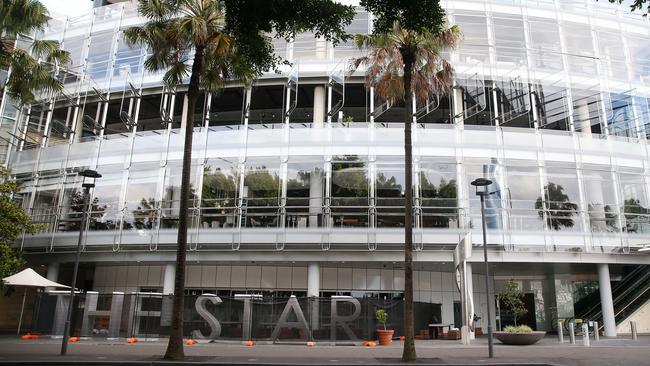
HESTA, with all its wholesome image, is an important partner of the KKR-led consortium chasing Ramsay Health Care for $20bn and now has a front row seat on the deeply uncomfortable pressure tactics being applied in a rush to get a deal done.
KKR has walked away from its own indicative $88 a share cash offer for the private hospital operator, a figure which is increasingly looking like a bait-and-switch, disguising its real desire to table the lower cash and share offer for investors in Ramsay and its part-owned French offshoot Ramsay Sante.

Ramsay had previously knocked back the cash and share offer, given investors would end up with a holding in a French stub – a highly illiquid stock listed on Euronext exchange – and it considered the offer overall “inferior”.
Wherever KKR goes in the UFC-style chase for Ramsay, its industry super partner follows, and this will get increasingly muddy for HESTA if the bid turns hostile.
In April HESTA chief executive Debby Blakey was talking up the buyout as having a positive impact for “patient health and wellbeing” in Australia and the international markets where Ramsay operates.
One CEO recently lamented the rise of big super joining forces with private equity to become a buyer of assets. He pointed out that the same super funds are in the room during financial briefings and some are actively bidding against the very companies they invest in.
A letter sent to Ramsay chairman Michael Siddle late on Monday night, and made public early on Tuesday, said that it was prepared to walk away unless Ramsay agreed to a new price – a textbook bear hug by KKR. On cue Ramsay shares dived at their fastest pace in two years, ending down 10.4 per cent at $62.94, back to its pre-bid price.
Now the hope for KKR is that Ramsay’s big investors might blink in the face of the loss of value and force the board back to the negotiating table to accept a lower price.

KKR, which has been working on the Ramsay play for nearly two years, cited the hospital operator’s disappointing full-year accounts tabled last month, which don’t reflect the value of its initial offer. There Ramsay reported a 21 per cent drop in pre-tax earnings to $891.3m for the year to end-June. The fall disappointed investors, with Ramsay blaming the impact that high Covid case numbers were having on elective surgery levels, mostly in Australia. Private equity is paid big dollars to stay two steps ahead and after getting access to Ramsay’s books earlier this year it should be the least surprised about the trend line. It remains a good pressure point for KKR to lower its bid, given what it described as a material deterioration in performance.
Ramsay’s board should know KKR doesn’t walk away quickly in bidding battles. And as long as big super partner HESTA is in its corner, KKR’s digging in for the long haul.
Asleep at the wheel
In corporate Australia’s long history of scandals, the question has to be asked again and again: what on earth was the board doing?
Despite repeated warnings that should have sounded alarm bells from a string of bank money-laundering disasters in recent years – from Commonwealth Bank to Westpac – with warnings about boards needing to be on top of and leading the way when it comes to risk management and culture, Star Entertainment was very much asleep at the wheel.
The Sydney-based casino operator’s board, at the time led by chair John O’Neill, can’t hide behind the excuse that bad news didn’t travel up. It is responsible for setting the culture and it simply was not asking the right questions – or it seems any questions – of senior management.
On Tuesday the NSW casino regulator said Star had been issued with a “show cause notice” after it was handed the findings of the inquiry headed by Adam Bell SC into its operations, concerning its multiple failings around money laundering. Star, which has 14 days to respond, says it is reviewing the report. As the inquiry unfolded, nearly the entire Star board flagged their intention to resign. The Bell inquiry did not make adverse findings against Star’s board, but it asked loudly what they were doing.

Running a casino is serious stuff. They are heavily licensed and regulated for a reason, and that is because of their ability to attract serious criminals, and be used to launder money or perpetuate gaming addiction. Then they are major single site employers – in Star’s case 8000 workers – and can play a big part of tax revenue, tourism, and construction and development.
None of this seemed to be obvious to Star’s board of directors. In Bell’s inquiry into Star they came across as more comfortable ticking boxes than putting the heat on executives. Even the executives running the riskiest of businesses – Star’s International VIP – appeared to run rings around the board.
Indeed the level of frustration is palpable in Bell’s conclusion. The non-executive Star directors were all well qualified, well intentioned and highly experienced directors. “The paradox is that people of this calibre presided over a dysfunctional culture,” Bell says in his findings.
“The culture which the board of Star Entertainment thought it had set bore little or no relationship to the real culture which was seen in the evidence presented … the way things operated at Star Entertainment when no one was watching”.
Bell slams the board’s “lack of insight” when money-laundering allegations were initially raised in October 2021. The board had a “lack of awareness” of the underlying merit of the allegations and delayed response to investigating many of them. This response also reflected poorly on Star’s senior management, who also allowed the board to drag its heels on the allegations.
Risk failures
In terms of risk management, two themes of failure emerged.
First, key risks were not escalated to the board. Second, members of senior management were prepared to “court the risk” despite the consequences if the risk was realised.
“Management repeatedly chose to run risks rather than avoid or contain them. Too often the question which was asked was ‘how can we do this?’ rather than ‘should we be doing this?,” the Bell report said. The failure to report bad news, or any news to the board, was a manifestation of a culture where business goals took priority over compliance goals, the Bell report concluded.
The most profound of the problems with reporting lines and a recurring theme was the failure to report necessary information to the board and its committees. Here former Star chief executive Matt Bekier should be responsible for much of these failures, Bell concluded.
“However, the board must also bear some responsibility, because it was required to have systems and processes in place to ensure that it received the information it needed,” the report said. “This was also a failure of risk management and reflected a system cultural problem.”
Be it in a casino, a bank or a mining company, the board is responsible for setting culture. To manage and contain risks of money laundering and criminal infiltration, the culture of a casino operator must be risk-averse. In Star’s case it became clear the directors had little or no understanding of the risks they were paid to watch over.
johnstone@theaustralian.
com.au




Private equity animal KKR is well-versed in the game of multibillion-dollar brinkmanship, but this is a new and very uncomfortable experience for friendly super fund HESTA.